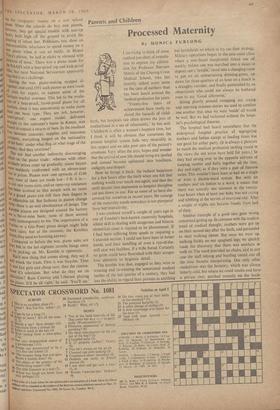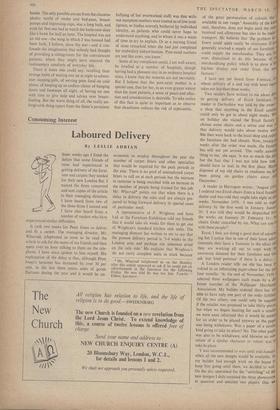Parents and Children
Processed Maternity
By MONICA FURLONG
AM trying to think of some method just short of immola- tion to express my admira- tion for Professor Norman Morris of the Charing Cross Medical School, who has recently talked more sense on the care of mothers than has been heard around the medical profession for years.
'Twenty-five years of achievement have vastly re- duced the hazards of child- birth, but hospitals too often drown the joys of motherhood in a sea of inhumanity,' he has said. 'Childbirth is often a woman's happiest time, but I think it will be obvious that sometimes the present hospital system fails very miserably in this respect and we take poor care of the patient's emotions. Very often the joys, hopes and wonder that the arrival of new life should bring are spoiled and instead become splintered into loneliness, indignity and despair.'
How he brings it back; the radiant happiness for a few hours after the birth when one felt that nothing would ever touch one again, and then the swift descent into depression as hospital discipline cut one down to size. For as some of us have dis- covered for ourselves in recent years, the scourge of the maternity wards nowadays is not puerperal fever but insensitivity.
I was confined myself a couple of years ago in one of London's best-known maternity hospitals, whose skill in dealing with dangerous and bizarre obstetrical cases is reputed to be phenomenal. If
had been suffering from quads or requiring a Caesarean section, I could not have been in better hands, and their handling of even a run-of-the- mill case was faultless, if a trifle bored. Certainly no germ could have flourished with their scrupu- lous attention to hygienic detail.
The trouble was that, engaged as they were in winning and re-winning the sensational medical battles of the last quarter of a century, they had lost the ability to regard their patients as anything
but battlefields on which to try out their strategy:, Military operations began in the ante-natal clinic, where a sour-faced receptionist ticked one off weekly, before one was marched into a sluice te deposit one's 'sample,' raced into a changing-roore to put on an embarrassing dressing-gown, sat down for three-quarters of an hour on a bench in a draughty corridor, and finally pummelled by an obstetrician who could not always be bothered even to say 'Good afternoon.'
Sitting glumly around swopping our cramp and morning sickness stories we used to comford one another that once we were 'inside' all would be well. But we had reckoned without the hospi-. tars psychological theories.
The hospital had heard somewhere that the widespread hospital practice of segregating mothers and babies except at feeding times war. not good for either party. (It is always a pleasure to watch the medical profession inching round te the views the old wives have held fo'r years.) Se, they had swung over to the opposite extreme of keeping mother and baby together all the time., day and night, as if they were a pair of Siamese twins. This wouldn't have been so bad on a single or even a double-ward system. But with six mothers and six babies to a ward, it meant that there was scarcely one moment in the 'twenty- four hours when at least one baby Was not crying, and nibbling at the nerves of everyone else. After. a couple of nights one became frantic from lad. of sleep.
Another example of a good idea gone wrong concerned getting up. In common with the modem trend of medical thought, mothers were got uy on their second day after the birth, and persuaded to start walking about. But once we were up., walking feebly on our spaghetti legs, we quickly
made the discovery that there was nowhere te,
walk to. The ward provided no chairs, and y
. in an case the staff tidying and bustling round ,one
the time became exasperating. Our only other rendezvous was the lavatory, which was always bitterly cold, but where we could smoke.and have a private chat, perched uneasily on the wash-.
basins. The only possible escape from the claustro- phobic world of swabs and bed-pans, breast- pumps and expressing-cups, was a long bath, and even for that one had to watch the bathroom door like a hawk for half an hour. The hospital was not an old one—the wing in Which I was housed had been built, I believe, since the war—and it con- founds the imagination that nobody had thought of providing a sitting-room for the convalescent patients, where they might have enjoyed the rudimentary comforts of everyday life.
There is more one could say, recalling their strange habit of waking one up at night to admin- ister sleeping-pills, of serving poor food on cold plates, of keeping up an endless clatter of banging doors and footsteps all night, of having no one with time to give help and advice over breast- feeding. But the worst thing of all, the really un- forgivable thing (apart from the Sister's persistent bullying of her overworked staff) was that with- out exception mothers were treated as of low intel- ligence, as bodies scarcely bothered by individual identity, as patients who could never hope to understand anything, and to whom it was a waste of time to try to explain. Or as a nursing friend of mine remarked when she had just completed her midwifery indoctrination, 'Post-natal mothers are just like cows, you know.'
Some of my complaints could, I am well aware, be levelled at a number of hospitals, though having had a pleasant stay in an ordinary hospital since, I know that the miseries are not inevitable. But I believe that the post-natal mother is a special case, that for her, to an even greater extent than for most patients, a sense of peace and affec- tion and consideration is desirable. To take notice of this fact is quite as important as to observe that cleanliness reduces the risk of septicmmia.



































 Previous page
Previous page